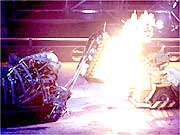Limits of Technology in War
 |
New technology, superiority of numbers and ambitious leadership are no doubt factors that make a difference, but cannot guarantee meaningful victory when employed individually or jointly in a war. Time has shown there are many other factors that can cancel out any or all of these. The most important one is the human factor that stand between brutal power and victory and can reduce the best war plans to ashes. The legendary leadership of Alexander the Great became ineffective when his prolonged campaign made the soldiers homesick, forcing him to turn back. Napoleon's powerful resolve became irrelevant when his soldiers were unable to stand the Russian winter, proving all the assumptions of his strategy wrong. Hitler's presumption that the Russians, tired of Stalin's oppressions, would welcome Nazi forces, met the same end, affirming that people's umbilical bond to the mother-land is stronger than the promise of transitory relief.
In case of Gulf War II also, the assumption that the shock and awe of the new technology would terrify the rulers, prompt their demoralized forces to surrender and encourage the oppressed to revolt against Saddam regime have proved wrong. This will take the offensive deep into the worst of the summer; some thing the coalition forces wanted desperately to avoid. How the American and British soldiers perform in the sweltering heat of the desert is yet to be seen. Longer wars imply more casualties irrespective of their safety standards. How their families, promised a quick return of their dear ones, react to the sacrifices of life for the profit of oil barons is still not known.
Technology may be more effective in the imagination of the rulers than the battlefield and still may fail to win the day in the historical sense. At least, that is how it worked out with the USSR, which lost to the bluff of Star War without firing a single shot. Technology of weapons may reach the farthest point and may be comprehensively annihilating and meticulously precise on its target, but is useless if it cannot conquer the hearts and minds of its victims --- and more often than not --- it does not.
Take the case of Vietnam where the USA poured out the guts of its military juggernauts on the slightly built, hungry and weak looking Viet Congs, without as much as bending their will. It only succeeded in making America hang down its head in shame. And what is the net result of much touted war of technology against the indomitable Afghans. It only helped to bring back the tyrants of yore, the tribal warlords, who had been chased out by the apparently mad puritans known as Taliban. With them returned a bumper poppy crop, as if sprouting from the bombs and bullets seeded by the mighty superpower. Tons of heroin is now on its way to the anxious American citizens, to claim the wages of the sins of their leaders and to numb the anxieties of their bewildered minds, as if following some mysterious law of natural justice.
The last show of the power of American technology was put up on the occasion of the Gulf War I, which was only meant to deliver a warning to an erring agent of America, which he swallowed with little ill effect. The dividend of the expedition, however, was not victory but the riches gathered from war reparations and collection of the bill of war expenses from the passive Arab states. The villain was interestingly left safe and sound in his fortress. This calculated ineptness has now provided another opportunity to the scheming superpower to try out the new weapons in their arsenal of technology, and to feed the infernal hunger of the military-industrial monster of America. The massive destruction they are wreaking on a systematically weakened and disarmed nation may help them to occupy a hostile territory for sometime. But it is overwhelmingly doubtful, if it can make the American dream of --- world domination by controlling the oil of the world --- come true.
It is again the human factor, which has surprised the adventurer. Iraqis may hate their ruler, but have shown that they love their land. Their collective wisdom has helped them see through the deception of the invader and their dignity has refused to submit to the technology of destruction. The certainty of technology has been once again defeated by the unpredictability of human behavior. Going to war implies courting death for all combatants. The only difference, and a very big difference, is that some fear the prospect and others welcome it --- call it suicide or martyrdom --- technology has yet to find a weapon against those who court death. Neither was it accounted for by the Americans as a weapon to reckon with.
Now there seems to be an influx of volunteers from all over the world to defeat the monster who has no respect for justice or peace and is perceived as their common enemy. They are rushing to lay down their lives --- the Indonesians to save the Arabs, the Muslims to save the socialists, the Shias to save the Sunnis and last but not the least even the Europeans to offer themselves as human shield. Those who cannot arrive are making themselves heard by the millions on the streets in no uncertain term. Could the conflict be converting into a cause of the people of the world, against the designs of one power to dominate the whole world by use of force?
The author is an independent commentator based in Karachi, Pakistan
Views:2500
The war is over, to all intents and purposes.
I pray that the Bush Administration won't fumble away the peace, but the early signs are not encouraging, as one of the other articles on your site notes.





